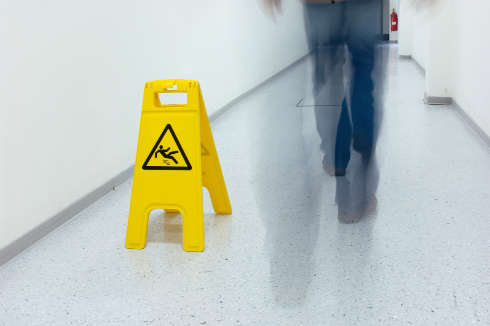The danger of injuries due to slips, trips and falls cannot be overestimated since such accidents may have life-threatening and long term effects. This is why smart slip testing methods and solutions should be implemented in the workplace.
As discussed in our previous article, one effective prevention strategy to minimise the risks of injuries due to slips, trips and falls is to use the right flooring material or floor surface in the design and construction of the building.
Apart from installing carpets and corks or using fibreglass grating, rubber, timbre or steel plates, the following flooring materials can help prevent accidents from happening:
Concrete. This building material is commonly used in driveways, paths, garages, basements, factories and warehouses. The slip resistance of concrete depends on its finish and wear. It is most effective against slips when its surface is textured. Most of the time however, concrete is covered with other flooring materials, such as tiles, carpets and wood.
Glazed Ceramic Tiles. These materials are commonly used in bathrooms and toilets. They are durable, easy to clean and slip-resistant, but tend to be slippery when wet, especially with soapy water. Anti-slip aids are needed if these materials are used in frequently wet areas.
Unglazed Ceramic (Quarry Tiles). These materials are suitable for kitchen floors and other areas where spills usually occur. They can also be used in shower rooms, bathrooms and toilets. To improve the slip resistance of quarry tiles, mould them with aggregates.
Plastic Matting. Slip-resistant plastic matting can be used in bathrooms. Its interlocking PVC (polyvinyl chloride) extrusions make it slip-resistant.
Terrazzo. This material is durable, long-lasting and beautiful. Since it improves the aesthetics of a space with its stylish designs and colours, terrazzo is popularly used in hotel lobbies and entrances of office buildings, as well as on pedestrian areas in malls. Terrazzo can be slippery when wet or dusty, or when excess polish is used.
Vinyl. This material is one of the most popular flooring surfaces in commercial buildings, which includes retail, light industrial, educational and healthcare facilities. These come in a wide range of styles (e.g. tiles, planks and sheets) and colours. Though unsuitable in areas where hot spills are likely to occur, they are easy to clean, durable, water resistant (especially when in sheet form) and less expensive than other flooring materials. Thicker but softer vinyl is more slip resistant than hard vinyl.
These are some of the commonly used flooring materials in commercial buildings. Knowing which one best suits your office environment or the design of your workspace is vital to minimise the risks of slips, trips and falls.
Ensure the safety of your customers, clients and employees, call in the experts at Slip Check to conduct a floor slip testing in your office space.
Whether you need independent slip assessment services to test floor safety, or you require a report and expert advice on the weaknesses and strengths of your case in a judicial proceeding, Slip Check can help you.
Author: Carl Strautins

Email: Carl@SafeEnvironments.com.au
Web: www.SafeEnvironments.com.au
As a principle at Safe Environments, Carl Strautins first started his career at CSIRO conducting research in slip resistance and developed the accelerated wear slip resistance test. He holds a degree in materials science, masters in occupational health and safety and a masters in science in occupational hygiene, Carl provides guidance to industry to minimise the risk of slip and fall incidents. He is engaged on a regular basis to provide expert opinion for disputes and legal proceedings.


